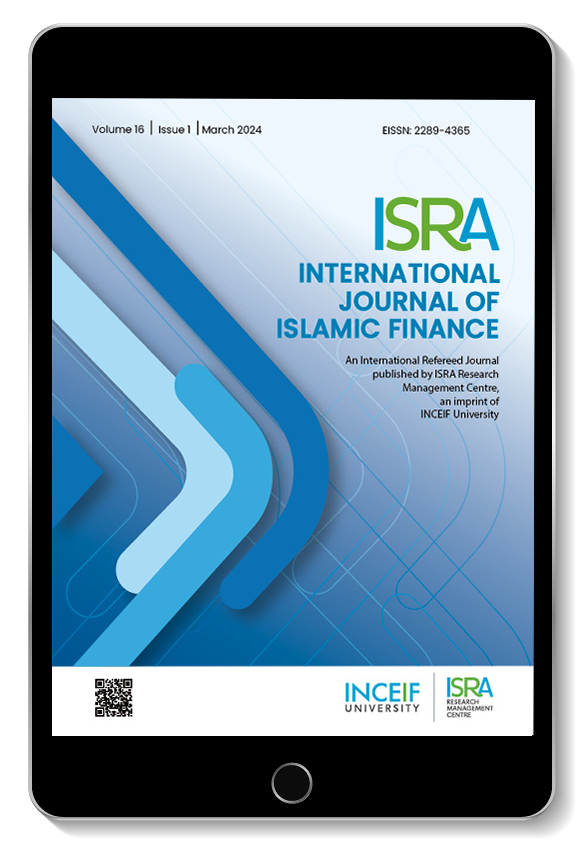Z世代的金融行为:伊斯兰金融素养的作用
IF 2.8
Q2 BUSINESS, FINANCE
引用次数: 0
摘要
目的——本研究旨在检验家庭沟通模式对印尼Z世代伊斯兰金融素养(IFL)和风险承受能力的影响。它还研究了IFL、风险承受能力和金融行为之间的联系。最后,它强调了IFL对风险承受能力和金融行为之间联系的调节作用。设计/方法/方法——这项研究使用了1995年至2001年出生于印度尼西亚西苏门答腊岛的Z世代穆斯林成员作为人口。这项研究在两个月内收集了668份回复。经过一些初步测试,如缺失值和正态性测试,它采用了571个可用的响应作为样本。进行了有针对性的抽样,并采用基于方差的结构方程偏最小二乘模型(SEM-PLS)作为数据分析方法。研究结果表明,家庭沟通模式,包括一致性和谈话取向,对IFL和风险承受能力有积极而显著的影响。IFL对风险承受能力和财务行为具有积极而重要的影响。令人惊讶的是,IFL还积极而显著地调节了风险承受能力和金融行为之间的联系。最后,风险承受能力显著影响金融行为。创新/价值——本研究有三个理论贡献。首先,它为IFL与其前因(如家庭沟通模式)及其后果(包括风险承受能力和财务行为)之间的关系提供了更好的理解和更复杂的模型。其次,它揭示了IFL对Z世代财务行为的显著影响——这一方面在以前的研究中被忽视了。第三,它扩大了先前研究的范围,将IFL作为风险承受能力和Z世代财务行为之间联系的调节因素。研究局限性/影响——尽管本研究进行了Harman的单因素分析,以预测常见方法偏差,但由于研究的横截面性质,它面临着常见方法偏差问题。其次,这项研究的重点是Z世代,这意味着大多数受访者都是学生,他们的经济行为仍然受到父母决定的影响。实际意义——这项研究对决策者,如Otoritas Jasa Kewangan(金融服务管理局)和伊斯兰银行和金融机构的管理有一些贡献。首先,为了提高Z世代的IFL,决策者必须使用双向沟通导向的方法来教育父母。其次,Z世代的金融行为受到金融知识和风险承受能力的影响;因此,政府和社会等决策者必须对Z世代进行IFL教育,并告知他们在进行金融活动时影响其风险承受能力的金融风险。文章分类——研究论文本文章由计算机程序翻译,如有差异,请以英文原文为准。
Generation Z’s Financial Behaviour: The Role of Islamic Financial Literacy
Purpose — This research aims to examine the effect of family communication patterns on Islamic financial literacy (IFL) and risk tolerance of Generation Z (Gen Z) in Indonesia. It also examines the link between IFL, risk tolerance and financial behaviour. Finally, it highlights the moderating impact of IFL on the link between risk tolerance and financial behaviour.
Design/Methodology/Approach — This study used Muslim members of Gen Z in West Sumatra Indonesia who were born between 1995 and 2001 as the population. This study collected 668 responses in two months. After some preliminary tests, such as missing value and normality test, it employed 571 usable responses as the sample. Purposive sampling was conducted and variance-based structural equation model-partial least square (SEM-PLS) was employed as the method for data analysis.
Findings — The results show that family communication patterns, both conformity and conversation orientation, positively and significantly influence IFL and risk tolerance. IFL has a positive and significant impact on risk tolerance and financial behaviour. Surprisingly, IFL also moderates the link between risk tolerance and financial behaviour positively and significantly. Finally, risk tolerance significantly affects financial behaviour.
Originality/Value — This research makes three theoretical contributions. First, it provides a better understanding and a more complex model of the relationship between IFL with its antecedents such as family communication patterns and also with its consequences, including risk tolerance and financial behaviour. Second, it reveals that IFL affects Gen Z’s financial behaviour significantly—an aspect which is neglected in previous research. Third, it has expanded the scope of prior studies by addressing IFL as a moderator of the link between risk tolerance and Gen Z’s financial behaviour.
Research Limitations/Implications — Even though this study has carried out Harman’s single-factor analysis to anticipate a common method bias, it faces the common method bias problem due to the cross-sectional nature of the study. Secondly, the study focuses on Gen Z, which means that most of the respondents are students and their financial behaviour is still affected by the decisions of their parents.
Practical Implications — This study has some contributions for decision makers such as Otoritas Jasa Kewangan (Financial Services Authority) and management of Islamic banks and financial institutions. First, to increase Gen Z’s IFL, the decision makers have to educate the parents using the two-way communication orientation method. Second, the financial behaviour of Gen Z is influenced by financial literacy and risk tolerance; hence, decision makers such as the government and society have to educate Gen Z on IFL and inform them about financial risks which influence their risk tolerance when conducting financial activities.
Article Classification — Research paper
求助全文
通过发布文献求助,成功后即可免费获取论文全文。
去求助
来源期刊

ISRA International Journal of Islamic Finance
BUSINESS, FINANCE-
CiteScore
3.40
自引率
17.40%
发文量
18
审稿时长
20 weeks
期刊介绍:
It is the aspiration of the editorial committee that IJIF achieves the highest rank in quality and substance. It is thus our aim that the journal be carried in the Thompson Reuters’ ISI and Scopus databases. By ensuring high standards in articles published in Islamic finance we ensure that further innovation and research is carried out and promoted in the Islamic finance industry and academia. IJIF publishes 2 issues per annum.
 求助内容:
求助内容: 应助结果提醒方式:
应助结果提醒方式:


